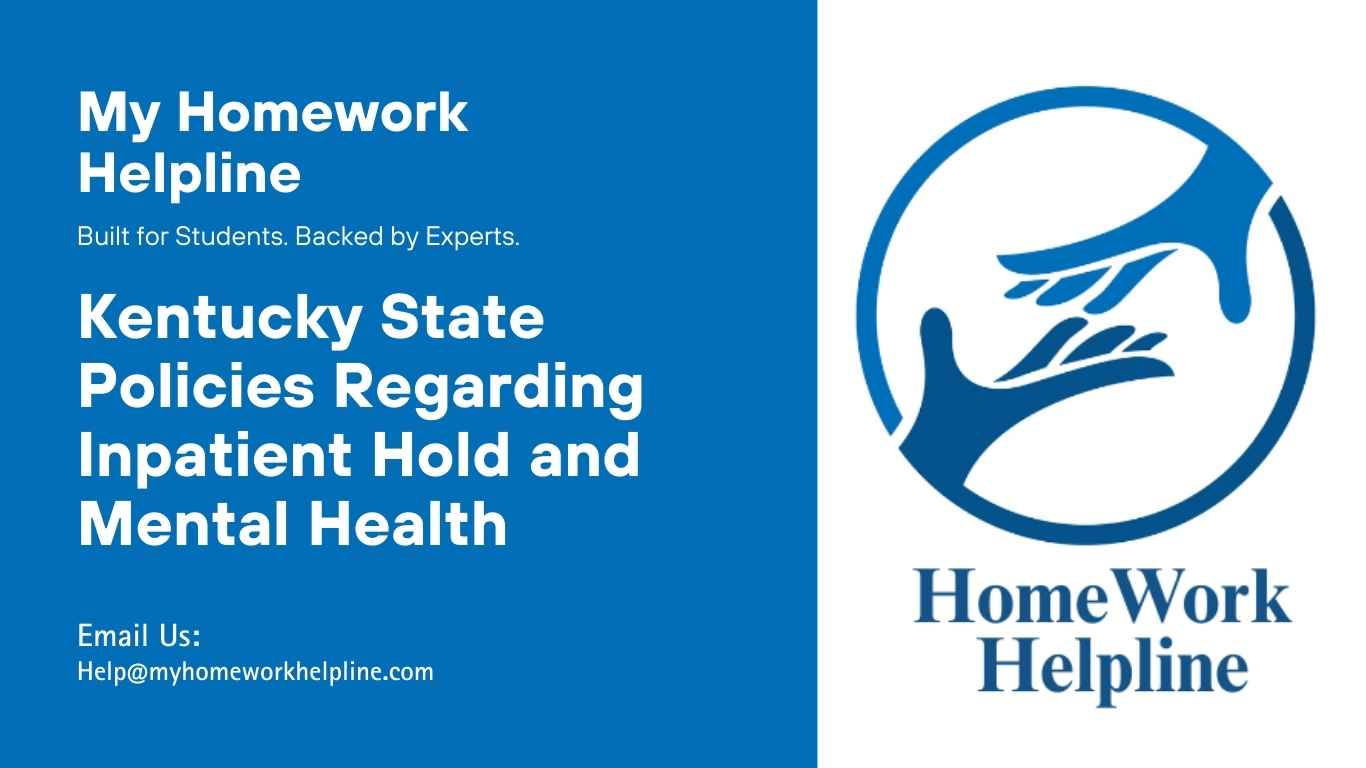Kentucky State Policies Regarding Inpatient Hold: Mental Health Essay
Kentucky Inpatient Hold
In Kentucky, the regulation is defined within KY. REV. STAT. ANN. 202A.026 directs that there is the prohibition of involuntary hospitalization of individuals of persons except for those that are mentally ill. Within that, there is a directive that points to three aspects that must be considered. The person must be a danger to themselves and others as a result of the mental health issue to the point that it would result in a threat of physical harm or actual injury. According to KY. REV. STAT. ANN. § 202A.011(2), this is defined as depriving themselves and others of the means of survival. Secondly, they can benefit from the treatment and thirdly, alternative nonrestrictive treatment isn’t available to them (Mental Illness Policy Org, 2022). The policy applies to all outpatients and patients that they can only be placed on hold when they deny reasonable survival needs to themselves and others to the point that they are destructive to the logic of life and living.
By state recommendation, for suicidal cases, is set as a time limit of no less than 72 hours which is considered an emergency hold whose absolute minimum can’t be less than 48 hours (). Extensions are enforced when a look back into 24 past months shows that there was another attempt. Kentucky is one of the two states that have the shortest look-back period despite them having more individuals with severe mental illness incarcerated than hospitalized. The state requires that there are at least two prior hospitalizations to actualize the hold (Treatment Advocacy Centre, 2018).
Understanding state mental health laws is complex, but professional support can simplify your work. Suppose you’re preparing a Kentucky State Policies essay, a research paper, or a psychology assignment. In that case, our team offers expert psychology homework help to guide you through inpatient hold regulations, emergency procedures, and legal requirements. Ensure your assignments are accurate, insightful, and well-structured while deepening your understanding of mental health policies with our dedicated academic support.
Limitation & Advocacy
A common limitation in Kentucky is the criminalization of individuals before they have been hospitalized a factor that takes away the immediacy of handling mental healthcare. Therefore, there is a gap between the justice system and the healthcare facilities leading to Kentucky being one of the highest rates in likelihood incarceration at 2.9 compared to hospitalization which stands at 1. That for every 5 mental health patients, only 1 is likely to be hospitalized which means that there is potential for fear created across the board (Treatment Advocacy Centre, 2018).
Potential Biases
Most potential biases toward a patient making suicidal statements are often related to the quick assumption that they are behaviorally inclined (Burke et al., 2017). As such, in the effort to diagnose or attempt at offering help, the first step made in this is to determine the dispositional factor sad n the maladaptive cognitive processes hence specificity that could be irrelevant. Holding bias within this leads to a poor offer of help or trying to make the patient comfortable which in the need could lead to clamming up. At the same time, another bias to recognize is the jump to securing the patient as it is assumed that they are a danger hence a big jump in trying to stop it in the future by detaining them. This leads to another assumption that detention is likely going to help through educational training. However, 48 to 72 hours is such a short time that sensitization of the patient can only be ignored. Giving information to the patient can be part of the problem when the underlying issues have rarely been recognized or diagnosed. It is thus presumptive to assume that every suicidal patient should be educated within such a short time.
I have encountered this bias before and I have learned that understanding the patient opening up is the most important way to approach the problem at the juncture of suicide, the patient is already crying for help and clinical practice could be beneficial to let them vent. This provides an opportunity for them to be listened to and in that way self-assess and be participants in their progression toward seeking help. This forces a collaboration between the patient and attending physician and caretaker which thus progresses to better planning that takes into account the short holding period. By taking that into focus, there is an integrative aspect that accounts for overall resource availability for the patient relevant to the individual experience instead of a generalization of all cases.
References
Burke, T.A, Connolly, S.L, Hamilton, J.L, Stange, J.P, Abramson, L.Y, & Alloy, L.B. (2017). Cognitive Risk and Protective Factors for Suicidal Ideation: A Two-Year Longitudinal Study in Adolescence. Journal of Abnormal Child Psychol 44(6):1145-60. DOT: 10.1007/s10802-015-0104-x
Mental Illness Policy Org. (2022). KY. REV. STAT. ANN. § 202A. Retrieved from https://mentalillnesspolicy.org/national-studies/state-standards-involuntary-treatment.html
Treatment Advocacy Centre. (2022). Eliminating Barriers to the Treatment of Mental Illness, Kentucky. Retrieved from https://www.treatmentadvocacycenter.org/browse-by-state/kentucky

